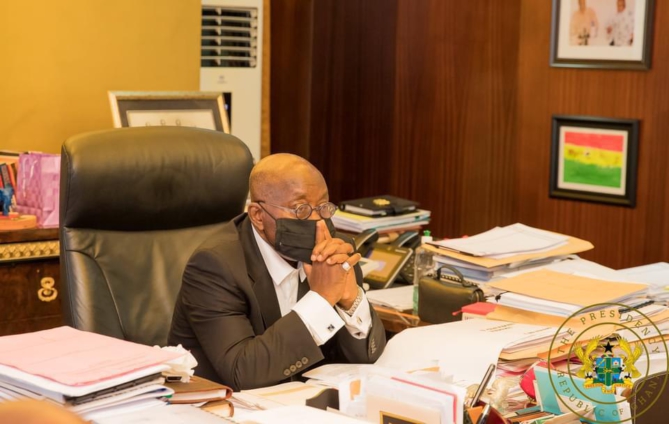President Nana Addo Dankwa Akufo-Addo has explained to Parliament his decision not to assent to the Criminal Offences Amendment Bill 2023, the Criminal Offences Amendment Bill Number Two, 2023 and the Ghana Armed Forces Amendment Bill 2023.
The President, in a letter to Parliament, which was read out to the House by Speaker Alban Sumana Kingsford Bagbin, cited financial implications for not assenting to the Bills.
He said upon a thorough review of the relevant constitutional and legislative frameworks, specifically Article 108 of the Constitution and Section 100 of the Public Financial Management Act 2016 (Act 921) it was evident that the Bills introduced as Private Member’s Bills by the Honourable Member of Parliament for Madina, Francis-Xavier Kojo Sosu, do not conform with the provisions of the Constitution.
The Armed Forces (Amendment) Bill, 2023, seeks to amend relevant Sections of Act 29 and the Armed Forces Act, 1962 (Act 105) to replace the Death Penalty with life imprisonment whereas the Criminal Offences (Amendment) Bill Number Two, 2023, seeks to abolish the Death Penalty.
On the other hand, the Criminal Offences (Amendment) Bill, 2023, seeks to proscribe witchcraft accusations.
The President said those Bills, which abolished the Statutory Death Penalty and criminalised the activities of witch doctors or witch-finders entailed substantial financial obligations on the Consolidated Fund and other public funds of Ghana, due to the projected costs related to imprisonment, sustenance and healthcare for those who would be convicted under the Bills when they became laws.
The Bills were passed by the House in July 2023 and presented by to the President in August and November this year for his assent.
However, the President, after holding a discussion with the Speaker on the Bills at the former’s office on 28th November, issued a letter to Parliament, dated 28th November, informing the House of his inability to assent to the Bills.
The President, in his second letter, noted that Article 106(8) states: “Where the President refuses to assent to a bill, he shall within 14 days after the refusal state in a memorandum to the Speaker any specific provisions of the Bill, which in his opinion, should be reconsidered by Parliament, including his recommendation for an amendment if any”
“Article 108: states that Parliament shall not, unless the bill is introduced or the motion is introduced by, or on behalf of, the President—
(a) proceed upon a bill including an amendment to a bill, that, in the opinion of the person presiding, makes provision for any of the following—
(i) the imposition of taxation or the alteration of taxation otherwise than by reduction; or
(ii) the imposition of a charge on the Consolidated Fund or other public funds of Ghana or the alteration of any such charge otherwise than by reduction; or
(iii) the payment, issue or withdrawal from the Consolidated Fund or other public funds of Ghana of any money not charged on the Consolidated Fund or any increase in the amount of that payment, issue or withdrawal; or
(iv) the composition or remission of any debt due to the Government of Ghana; or
(b) proceed upon a motion, including an amendment to a motion, the effect of which, in the opinion of the person presiding, would be to make provision for any of the purposes specified in paragraph (a) of this article.”
“Therefore, in the light of this significant Fiscal Impact, these Bills should not have been introduced without prior fiscal impact analysis nor without my initiation or on my behalf,” the President said.
He noted that the absence of such analysis precluded those Bills from being properly classified as Private Member’s Bills.
He said the legislative power entrusted to the Parliament came with the responsibility to ensure that all enacted laws complied with the constitutional provisions safeguarding the nation’s fiscal integrity and upholding the principles of governance.
“Mr Speaker, it is for the above reasons that I, in preserving the sanctity of the Legislative process, refused to assent to the Bills,” President Akufo-Addo said.
“I take this opportunity to reiterate my support for the contents of the Bills and my intention for them to be reintroduced in Parliament on my behalf in due course.”
Speaker Bagbin, on his part, disagreed with the President’s opinion on the matter and promised to present his statement to the House within this week, after which the House could debate it.
The Speaker did not allow Mr Osei Kyei-Mensah-Bonsu, the Majority Leader and Leader of Government Business, to make his remarks concerning the statement.
He noted that all members of the House would be allowed to comment on it after he had delivered his statement within the week.
Latest Stories
-
Paris 2024: Opening ceremony showcases grandiose celebration of French culture and diversity
3 hours -
How decline of Indian vultures led to 500,000 human deaths
3 hours -
Paris 2024: Ghana rocks ‘fabulous fugu’ at olympics opening ceremony
4 hours -
Trust Hospital faces financial strain with rising debt levels – Auditor-General’s report
4 hours -
Electrochem lease: Allocate portions of land to Songor people – Resident demand
4 hours -
82 widows receive financial aid from Chayil Foundation
5 hours -
The silent struggles: Female journalists grapple with Ghana’s high cost of living
5 hours -
BoG yet to make any payment to Service Ghana Auto Group
5 hours -
‘Crushed Young’: The Multimedia Group, JL Properties surprise accident victim’s family with fully-furnished apartment
5 hours -
Asante Kotoko needs structure that would outlive any administration – Opoku Nti
6 hours -
JoyNews exposé on Customs officials demanding bribes airs on July 29
6 hours -
JoyNews Impact Maker Awardee ships first consignment of honey from Kwahu Afram Plains
7 hours -
Joint committee under fire over report on salt mining lease granted Electrochem
7 hours -
Life Lounge with Edem Knight-Tay: Don’t be beaten the third time
8 hours -
Pro-NPP group launched to help ‘Break the 8’
8 hours

